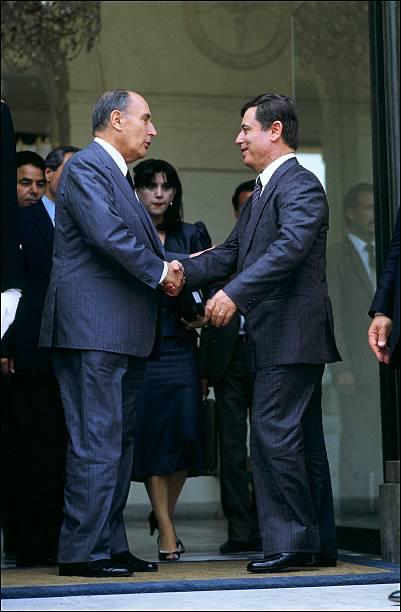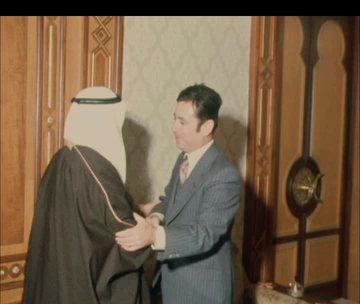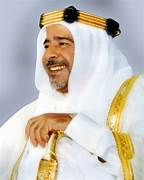Reliable Arab sources in Paris have revealed to Al-Qabas that Mr. Abdul-Halim Khaddam, the Syrian Vice President, will request support from French officials during his current visit to Paris for Syria’s role in bringing peace to various parts of Lebanon. He will also discuss Syria’s official endorsement of the French-Soviet initiative calling for peace negotiations within the framework of the United Nations Security Council.
Khaddam arrived in Paris on Tuesday afternoon, marking his first official visit to France since his appointment as the Syrian Vice President. It is also the first official visit by a senior Syrian official to Paris since the meeting between President Hafez al-Assad and President Mitterrand in Damascus in December.
Shortly after his arrival, Khaddam held a round of talks with the French Foreign Minister, Jean-Bernard Raimond, followed by a dinner hosted by Raimond in honor of the Syrian official at the Ministry of Foreign Affairs. During the dinner, words of exchange were shared.
On Wednesday morning, Prime Minister Jacques Chirac will receive Mr. Khaddam, conducting detailed discussions with him. Subsequently, a lunch in his honor will be held. In the afternoon, Khaddam is expected to hold a meeting with a high-ranking French official, whose identity is being kept confidential until now. Khaddam will also meet Jack Lang, President of the French National Assembly.
There is a possibility that Khaddam will meet with President Mitterrand on Thursday morning before leaving France at the end of his official visit. Until last night, the timing of the meeting between Mitterrand and Khaddam had not been confirmed.
Al-Qabas has learned from reliable Arab sources in Paris that Khaddam’s discussions with French officials will address the following key issues.
1- First and foremost, the Lebanese file. Khaddam is effectively responsible for the Lebanese file in Syria. French officials are well aware of this, understanding that Khaddam will dedicate a significant portion of his talks with them to explain in detail what Syria is doing in the Lebanese arena and its plans for the upcoming phase.
Al-Qabas has learned that Khaddam will specifically request from French officials an understanding of and support for Syria’s current efforts in West Beirut and other Lebanese regions with the aim of achieving a stable ceasefire as a prelude to bringing peace to the country.
Khaddam will emphasize to the French that Syria has not limited its peaceful efforts to West Beirut alone but intends to expand its activities to the outskirts of Beirut, then southern Lebanon, and gradually to various regions in Lebanon, including Christian areas.
Khaddam will ask French officials to work on convincing Christian parties opposed to the current Syrian role of the necessity to cooperate with Damascus and not to obstruct Syrian new plans. Khaddam will not ask French officials to issue an explicit official statement declaring France’s support for the entry of Syrian forces into West Beirut or other Lebanese areas. However, he expects his visit to be an opportunity to announce to senior French officials, headed by Chirac, that Syria is working for peace in Lebanon and that cooperation between Beirut and Damascus is essential to achieve peace.
The second topic in these discussions is the joint French-Soviet initiative in the Middle East, details of which were announced during President Mitterrand’s visit to Moscow last week and his talks with Soviet leader Gorbachev. Informed Syrian sources have confirmed to Al-Qabas that Khaddam will inform the French that Syria supports the joint French-Soviet initiative, calling for peace negotiations to resolve the Arab-Israeli conflict within the framework of the United Nations Security Council. The negotiations would involve the permanent members of the Council and the relevant parties in the Arab-Israeli conflict, paving the way for an international conference. Syrian sources have expressed satisfaction with this French stance, considering it a departure from the U.S.-Israeli line and the positions of several European countries, notably Britain. Khaddam will seek clarifications from French officials regarding this initiative and whether France is determined to continue and support it despite the opposition of the United States, Britain, and Israel.
The third topic in these talks is Syria’s relations with both the Palestine Liberation Organization (PLO) and Jordan, which particularly concerns the French side. Khaddam will brief French officials on recent developments in Syrian-Jordanian relations, emphasizing their continuous growth across various fields, according to a prominent Syrian official speaking to Al-Qabas.
The fourth topic will be the Iraq-Iran War, occupying a significant portion of the Syrian-French discussions. Khaddam will explain Syria’s perspectives on the future of this war and the reality of its position regarding closer ties with Iraq. He will also emphasize the necessity of improving and developing Franco-Iranian relations.
The fifth topic is hostages. Although Khaddam will not specify a particular date for the release of the French hostages held in Lebanon, he will assure French officials that Syria continues its efforts to resolve this issue as soon as possible. The new atmosphere between Damascus and Tehran could aid in this regard.
The sixth topic is terrorism. Khaddam will affirm to French officials that Syria opposes and condemns terrorism, denying any encouragement for it, contrary to claims by Washington and Tel Aviv. Syria is ready to cooperate with other countries to put an end to terrorist activities. However, Khaddam will stress the need to differentiate between terrorism and the legitimate armed struggle conducted by the Palestinians.
The seventh topic is bilateral Syrian-French relations. It’s known that the issue of Syria acquiring French weapons and military equipment will be raised during Khaddam’s visit to France. The Syrian Vice President will hold a press conference on Thursday morning at the Crillon Hotel, where he will discuss the results of his talks with French officials.



